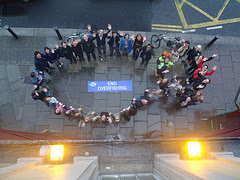IWT's summer of sustainable seas continued on 3rd July at its monthly meeting of Green Drinks with Mike Walker from OCEAN2012 (http://www.ocean2012.eu/) coming to speak about overfishing and the OCEAN2012 campaign. OCEAN2012 is an alliance of organisations dedicated to stopping overfishing, ending destructive fishing practices and and delivering fair and equitable use of healthy fish stocks.
Mike outlined to the meeting some of the shocking facts and figures associated with overfishing. Currently, 63% of fish stocks in the Atlantic are overfished, 82% in the Mediterranean, and four out of the six stocks for which scientific advice is available in the Baltic. Over 20% of fish stocks are being fished beyond safe biological limits, meaning their very future is threatened. North Sea fish catches have declined from 3.5 million tonnes a year in 1995 to 1.5 million tonnes in 2007, and the larger fish at the top of the food chain are dying out as we literally eat our way through them. For example, North Sea cod reach spawning age at four years old, while the average age of cod caught in the North Sea is 1.6 years, meaning that 93% of cod are caught before they can reproduce. This means that there are virtually no large mature cod left. The difference between the cod caught in the past and the cod caught today can be seen in the two images below
At present, not only is the EU fleet is estimated to have the capacity to fish two to three times the sustainable level, but much of the fishing fleet is sustained by subsidies, meaning we are paying twice for our fish. The EU's Common Fisheries Policy needs to be changed urgently to bring about a sustainable fishing industry. Review of the Policy is underway at present, but vested interests opposing change mean it is vital to keep the pressure on policy makers.
 |
| Cod in the past |
 |
| Cod today |
 |
| Fish Shape outside Messr Maguires |













